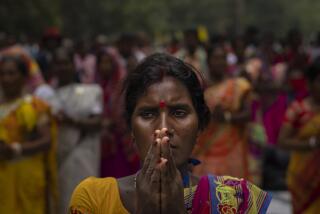Followers Flock to Persistent Preacher
- Share via
AHMEDABAD, India — For years, Hareesh Balbariya sold bootleg liquor from a ramshackle shop in a slum in this western city. He beat up people who questioned his work. He even named his children after Hindu demons.
“I was meaner than the devil himself. I was the king of evil,” he says. Today, he prays three times a day and thinks nothing of giving away money, though he is poor himself.
Balbariya credits his transformation to Pandurang Shastri Athavale, a Bombay preacher whose blend of community spirit and religious harmony has found 2 million followers in India and around the world.
The Philippines-based Ramon Magsaysay Foundation recognized the movement this year for its potential for helping poor people help themselves. It gave Athavale its rural development award, whose previous recipients include Mother Teresa and the Dalai Lama.
Athavale’s followers see God--in whatever form--in each person. To help the community is to help God, they say.
Persistence and leading by example are hallmarks of the movement. Over five years, Athavale’s followers visited Balbariya’s shack, singing hymns and trying to chat with him.
“I used to beat them up each time,” Balbariya says with a chuckle. “But they kept coming back. . . . They asked for nothing, not even water. I figured they must be good guys. Gradually, I began to change.”
For the past several years, Balbariya has run a legitimate business selling cigarettes and candy from a brightly painted stand.
Academic researchers say Athavale’s social development model has lifted hundreds of thousands of Indians from poverty and improved farming and fishing.
Athavale (pronounced ah-THA-va-lay) has persuaded farmers to give away crops to the needy and fishermen to donate one catch each year to their communities “out of love for God.”
“Unlike the work of other volunteer groups, the change here is brought about because of transformation within each person,” says Rajkrishna Srivastava, a research fellow at the independent Center for Study of Developing Societies in New Delhi.
Athavale emphasizes the Hindu philosophical concept of “swadhyaya,” or introspection, and adherents are called swadhyayees.
Swadhyayees operate 3,400 farming and fishing collectives in India. Whatever is earned from selling their produce is used for the common good of the village. Activists sometimes even work for free in houses of people they wish to befriend.
“If you consider it as service to God, you won’t mind it,” says Manishbhai Yadav, a gynecologist who teaches hygiene to slum dwellers in Ahmedabad, the Gujarat state capital 540 miles southwest of New Delhi.
Poor villagers pool money to help neighbors in distress, and they don’t want the money back.
“Since we are all one family, we know who’s in trouble. We leave the money in an envelope in the temple. A village elder then gives it to the needy person, saying it’s God’s gift. . . . It avoids embarrassment to the giver and the receiver,” says Maheshbhai Shah, another swadhyayee.
Swadhyayees in the coastal town of Veraval once pooled the equivalent of $22,000 to help a fisherman whose boat was destroyed in a storm. He gave away twice that amount later.
While still in a religious school, studying philosophy and languages, Athavale began touring India’s western states of Maharashtra and Gujarat, emphasizing the Hindu philosophical treatise, “Bhagawad Gita,” which says labor with faith in God will contribute to a strong society.
His swadhyaya movement formally began in 1954 in rural Gujarat when 19 of his followers began visiting villages ridden with crime and bootlegging.
From fishing hamlets along the Indian coast to small pockets in the United States, Britain and the Caribbean, 2 million people now practice swadhyaya, Athavale says. His group accepts no donations, has no formal organization and accepts followers of all religions.
Athavale has now extended his goals to uniting clusters of 20 villages that jointly own a 20-acre collective farm and give away their produce to nearby villages.
“When devotionalism becomes a social force, the problems of humanity can be solved,” Athavale says.
More to Read
Sign up for Essential California
The most important California stories and recommendations in your inbox every morning.
You may occasionally receive promotional content from the Los Angeles Times.












